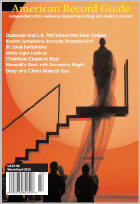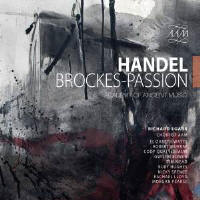Texte paru dans: / Appeared in: AAM007 |
|
|
Outil de traduction ~ (Très approximatif) |
|
|
Reviewer: Peter
Loewen
This lavish release culminates
a years-long examination of Handel’s Brockes-Passion involving numerous
scholars and editors, several of whose essays appear in the substantial book
of notes. For example, Leo Duarte explains the need for a new critical
edition, which he based in part on manuscript evidence that came to light
after the Bärenreiter edition appeared in 1965. Tracing the history of the
work through the 13 discrete sources listed in the notes shows that the
music took various forms. The trail begins in Hamburg on Good Friday of
1716, when Handel first performed the Passion on a text by Barthold Heinrich
Brockes (1680-1747). Setting this narrative against Handel’s rise as a star
of the Italian opera in London makes for a good story, as Jane Glover notes
in her essay. Subsequent performances of the Brockes-Passion in Germany
involved adjustments to the original score, yielding an alternate sinfonia,
arias, recitatives, and even instrumentation. These are performed in
appendixes on Disc 3, where we also get a performance of Charles Jennens’s
English translation of the first 14 numbers. Dr. Ruth Smith explains in her
short essay that Jennens, Handel’s primary English librettist, had scribes
prepare for him a copy of the music without text so that he could more
freely adapt his translation. But Jennens’s translation breaks off in the
middle of the recitative (15b) ‘The Heavy Load of Sins Oppress Me’, where
Jesus laments his afflictions.
It is a fascinating piece and
a beautiful performance. Soloists, instrumentalists, and chorus are
universally excellent. This is an early work of Handel’s and yet bears all
of the characteristics of his later English oratorios. Da capo arias and
recitatives reflect norms of contemporary Italian opera composition, and
choruses are typical of Italian oratorios. Handel’s writing is exquisite
everywhere, though he seems at his best in the slow arias. The duet between
Mary and Jesus (Rachel Lloyd and Cody Quattlebaum) ‘Soll Mein Kind, Mein
Leben Sterben’ is particularly expressive. There are many other great
moments here. | |
|
|
|
|
Cliquez l'un ou l'autre
bouton pour découvrir bien d'autres critiques de CD |
|




